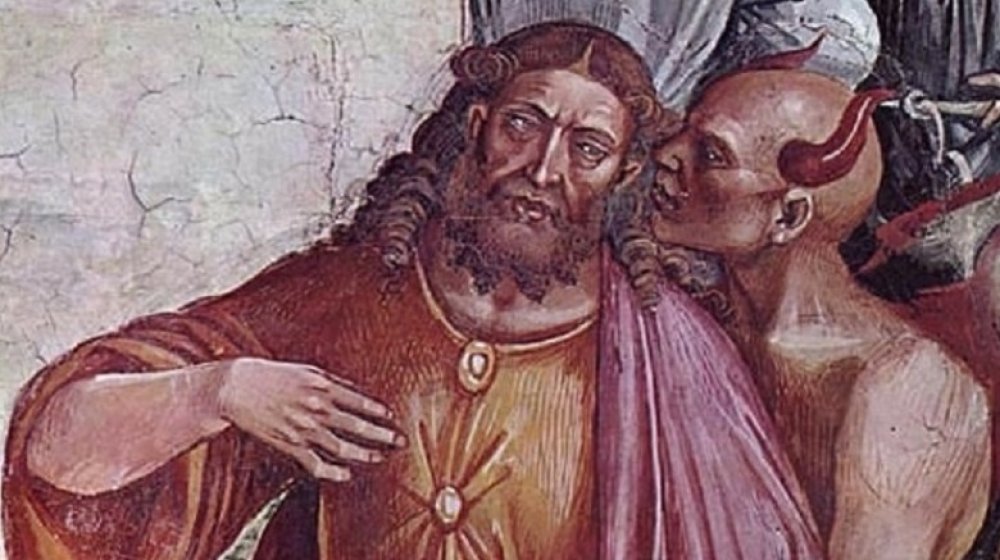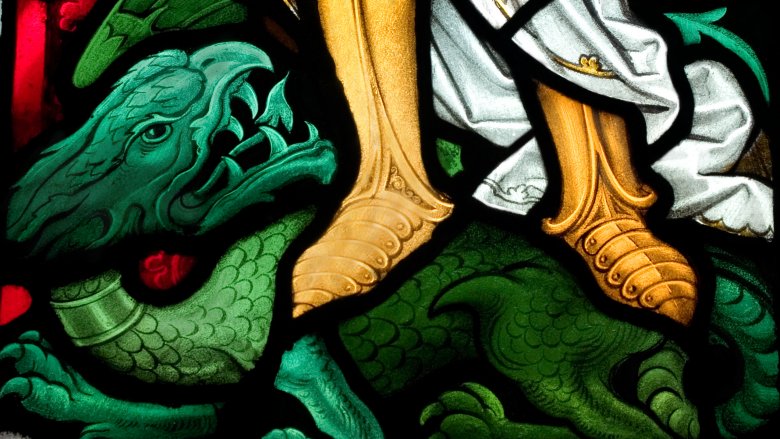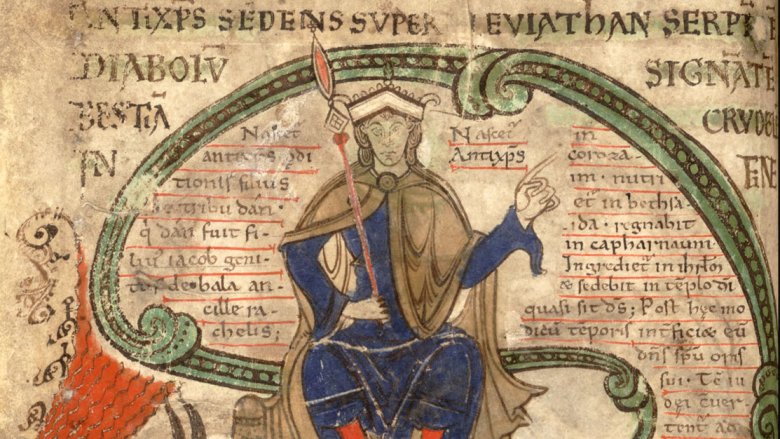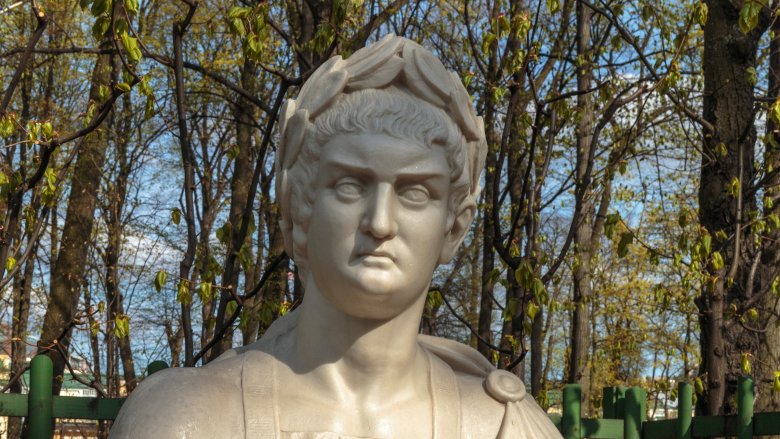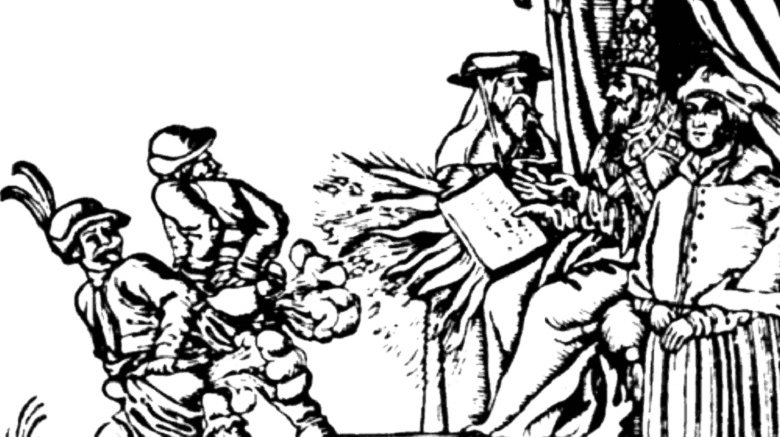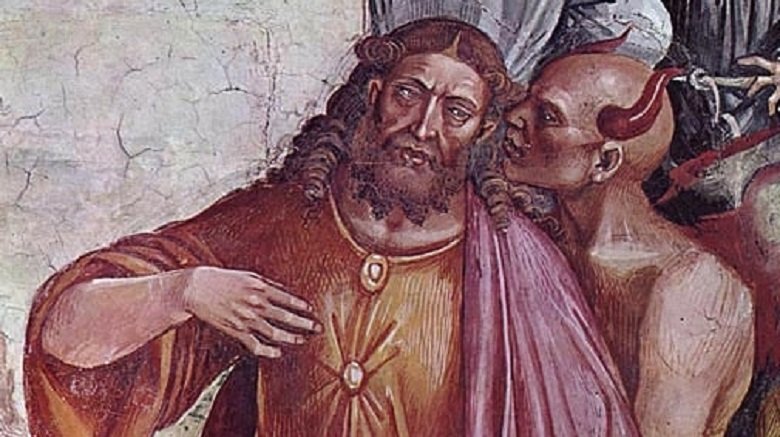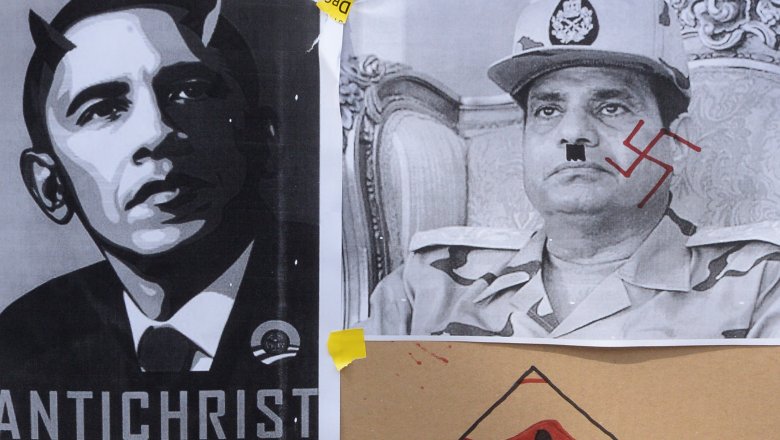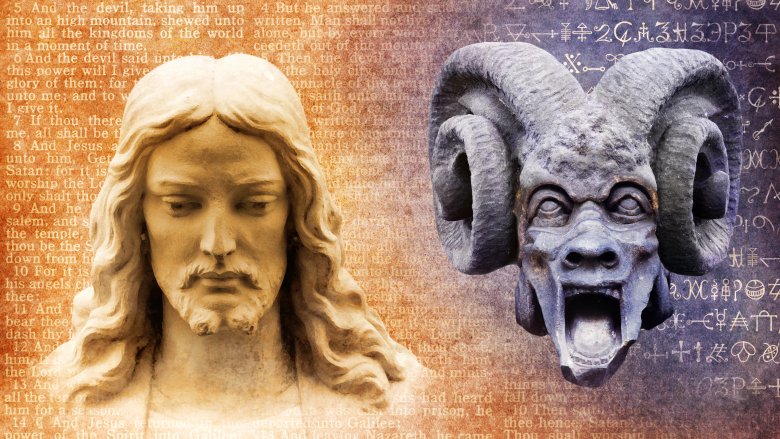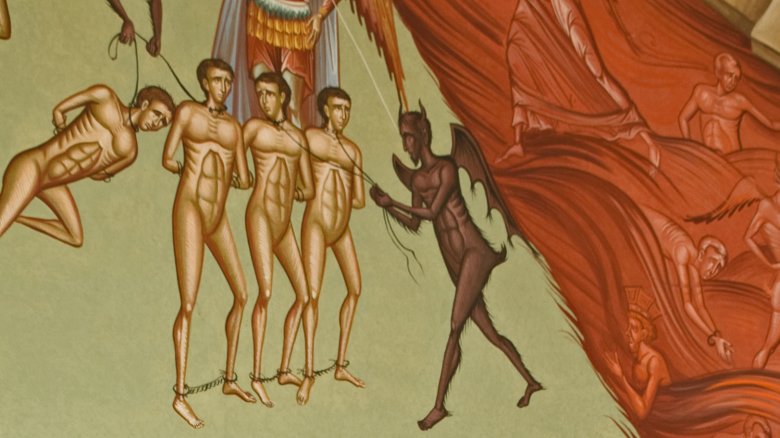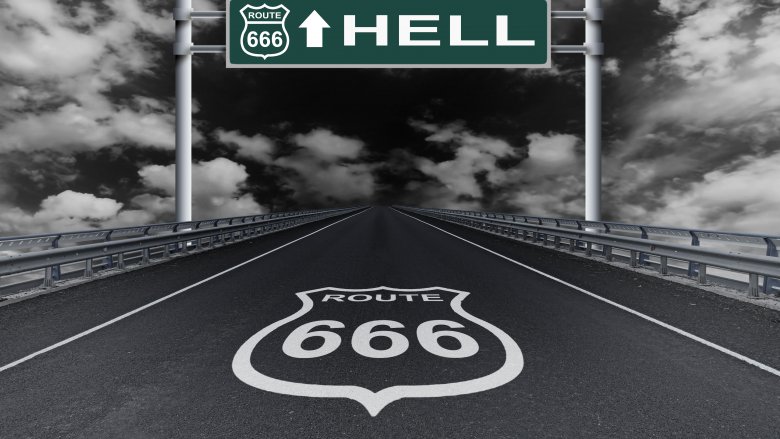The Untold Truth Of The Antichrist
The Antichrist is usually understood to be a really bad guy who makes everyone worship Satan and who has something to do with the end of the world. Many Christians fear this terrible entity, others want him to show up so Armageddon can start, and anyone who wants to seem badass and counterculture gets a 666 tattoo.
But the Antichrist is woefully misunderstood. The Bible barely mentions one, so later people filled in the gaps and connected some dots that were never meant to be connected. For a long time, the Antichrist wasn't even a single person, but a concept, while Islam has its own version of the Antichrist. A whole lot of people have been accused of being the ultimate Big Bad over the years, and for those who go looking, the Antichrist seems to be everywhere, lurking in the most random places, ready to lead followers away from the Church.
No wonder a lot of people are absolutely terrified of him.
The Bible isn't that interested in the Antichrist
The Antichrist is tied inextricably to the Bible, so it's weird how little the holy book mentions him (or it). According to the Encyclopedia Britannica, the term "Antichrist" only appears four times, and all in I John and II John. But John doesn't talk about one evil guy who is going to come at the End Times; he says there have already been lots of Antichrists including absolutely everyone who doesn't believe in Jesus. Jesus does mention "false messiahs and false prophets" in Matthew 24:24, but it's clear he means more than one. Even if you go outside the Bible, early Christians really didn't care about this Antichrist guy. Only one dude brought it up, and he basically just quoted John.
While he never used the word "Antichrist," the idea of a single guy who would go against God comes from Daniel in the Old Testament. But Daniel had a specific person in mind, the ruler of Palestine, Antiochus IV Epiphanes. He wasn't talking about a vague future evil entity; he was saying a specific guy was horrible.
You'll notice there's no mention of Revelation yet. PBS says that's because the Beasts in Revelation (there are two, one from the land and one from the sea) and the number 666 were never meant to have anything to do with the Antichrist. It was John of Patmos talking in allegory and code about how everyone in the Roman Empire was horrible.
One guy made up basically everything about the Antichrist
It wasn't until 950 A.D., almost a thousand years after Jesus died, that someone wrote down just who exactly this Antichrist guy was going to be. According to PBS, Queen Gerberga (sometimes "Gerbera") of France asked the monk Adso of Montier-en-Der for clarification on details about the Antichrist because the Bible sure didn't have specifics and neither did other church writings. So this one random monk got to make up whatever he wanted, and it went as viral as something could for the Middle Ages. The letter he wrote the queen was updated by other people who threw in their own ideas, but for hundreds of years, what Adso said about the Antichrist was, for lack of a better term, gospel.
The Encyclopedia Britannica says Queen Gerberga was worried she was living in the last days and wanted to know what to be on the lookout for. "Little Book on the Antichrist" was written in a popular style of the day, following the life of a saint, or in this case, an antisaint.
Adso believed the Antichrist wouldn't show up until the end of the Holy Roman Empire. He'd be born a Jew in Babylon, and the devil would make him the most wicked guy ever. But he would look a lot like the second coming of Christ: going to Jerusalem to minister, performing miracles, and rebuilding the Temple. Everyone would follow him, but he would persecute Christians for three and a half years. Fortunately, real Jesus would come along and kill him.
Revelation finally showed up to the party after 1,000 years
After Adso, the medieval idea of the Antichrist was mostly set, but the monk Joachim Of Fiore came along in the 1100s and had his own stuff to add. According to the journal article "Antichrists and Antichrist in Joachim of Fiore," this guy was obsessed with the idea of the Antichrist. It was basically all he could talk about. He became famous in his own lifetime for being the go-to person for prophecies about the Antichrist.
Other than John of Patmos (author of Revelation), Joachim was probably the most important apocalyptic thinker ever. The Encyclopedia Britannica says he saw the End Times being right around the corner. But there wasn't going to be just one Antichrist according to Joachim, but a whole bunch of them over time. Some already lived, like Nero, Muhammad, and Saladin. They were Antichrist more generally, but there would be one finally really bad Antichrist signaling the beginning of the end. In Revelation, a guy named Gog shows up to battle Christians. Joachim tied the final Antichrist to Gog, using that name, and after 1,000 years, Revelation and the Antichrist were finally connected.
Peoples of the Apocalypse: Eschatological Beliefs and Political Scenarios records one notable thing about Joachim's theories was he didn't think the Antichrist would be Jewish. It was just accepted fact then that since Christ was a Jew, the Antichrist would be, too. But Joachim said those who'd really hurt Christianity would come from inside the church. He thought the Jews were off the hook.
Martin Luther discovered who the real Antichrist was, his enemy
Martin Luther started out as a monk who had some polite ideas on how the Catholic church could improve. Then no one listened to him, so he published his "95 Theses" and blew that popsicle stand, effectively starting his own version of Christianity, which would become Protestantism. After that, he was locked in a struggle with the pope. Conveniently for him then, according to "The Papal Antichrist: Martin Luther and the Underappreciated Influence of Lorenzo Valla," he discovered that the entire concept of the papacy was the Antichrist.
PBS explains that Luther really didn't want to come to that conclusion. But he had to when the Catholic church refused to acknowledge the problem with indulgences and paying for salvation. Once he did, he saw Catholicism, specifically the guy at the head of it, as deliberately trying to undermine Christ. Vatican Files says Luther also thought the pope was trying to take Jesus' place by claiming to represent him. These things made the current pope, and indeed all the popes, Antichrist.
Once Luther saw Antichrist at work, he decided the End Times were imminent and that his battle with the papacy was an apocalyptic one. Luther's views that Pope = Antichrist became popular, partly thanks to woodcuts like the one above. Called "The Beautiful View," it shows the Antichrist pope handing over a flaming indulgence to farting peasants. Theological debate hasn't always been very serious.
Putting the the back in the Antichrist
After Martin Luther, people basically stopped thinking about the Antichrist being a single bad guy for hundreds of years. "The" Antichrist became a thing of the past, and something being Antichrist, that is, against Christianity, was in vogue. According to The Gospel Coalition, it wasn't until about 1900 that "the" returned to the Antichrist. These days, it's so common to speak of "the" Antichrist that older documents that only refer to Antichrist sometimes have "the" inserted in brackets in front of it, as if the original author made some kind of silly mistake leaving it out. But usually they didn't. They meant exactly what they wrote, that Antichrist was a concept, not a person in need of the definite article. Even the Bible doesn't always say "the": of the four OG mentions of Antichrist in I and II John, one of them doesn't include "the" in front of it.
Protestants especially just said Antichrist. That's because after Martin Luther, Protestants continued the tradition of believing the papacy and Catholicism were Antichrist. Islam was also sometimes referred to as being Antichrist. Protestants didn't see the End Times as a fight against one person but against all the people who didn't believe what they believed.
So what changed? Weirdly, Nietzsche might be largely responsible for the switch from Antichrist back to "the" Antichrist. In 1895, he published a very anti-Christian book called The Antichrist, and it entered popular vernacular. By the 1970s, Christians had fully accepted the Antichrist as an individual again.
Muslims have their own Antichrist
Jesus is an important figure in Islam, so it makes sense that Islam has its own version of the Antichrist. Al-Masih ad-Dajjal is the ultimate bad guy for the Islamic version of the End Times. "The Deceiving Messiah" doesn't actually appear in the Quran, but he does come up a bunch in the Hadith (sayings attributed to the prophet Muhammad, which are almost as important), according to Inter-Islam. Unlike the Bible, the Hadith goes into minute detail about who this guy is, what he will look like, and where he'll come from.
The Encyclopedia Britannica says Al-Dajjal is recorded as "a plump, one-eyed man with a ruddy face and curling hair." He also has the Arabic letters spelling "unbelief" on his forehead, so he should be easy to pick out of a lineup. Much like the Christian version of the Antichrist, he'll show up during times of chaos, go to Jerusalem, be followed by the Jews and others, and perform miracles. He'll reign for either 40 days or 40 years (it's unclear) and then Jesus comes back to save the day.
Tradition states that Al-Dajjal is already on Earth, he just can't show himself yet. The legends reveal he's on an island in the East Indies and that sailors passing it can hear the sound of beautiful music and dancing. Another version says he's bound to a rock on the island and depends on demons for food.
If you ever become powerful, someone will call you the Antichrist
Name a powerful man in history and it's guaranteed someone thought he was the Antichrist. You have the more obvious candidates, like Hitler, but anyone with any amount of authority could qualify. (But usually only if they were a dude; apparently people don't see the Antichrist as an equal opportunity position.) The Gospel Coalition says virtually every pope has been accused of being the Antichrist, as well as Nero, Henry Kissinger, Mikhail Gorbachev, and Napoleon, among many others.
U.S. presidents are a popular Antichrist contender. Slate reports the first to be seriously accused was probably FDR, with his support of the UN considered a bit too one-world-government for many Christians. JFK was obviously a concern for some Protestants since he was Catholic. A man tried to kill Reagan in 1990, telling the Secret Service agents who stopped him that he had to do it because the former president was the Antichrist.
This isn't something that has gone away as people get all modern and logical, unlike those dumb superstitious people in the past. According to Live Science, in a 2010 Harris Interactive poll, 14% of Americans thought President Obama might be the Antichrist. When broken down by political party, a full quarter of Republicans thought it was a possibility. These weren't idle thoughts, either. In 2011, a heckler accused Obama of being the Antichrist at a fundraiser, and a man took shots at the White House the same year, saying God told him to kill the Antichrist president.
Antichrist and antisemitism overlap majorly
Historically, if gentiles (non-Jews) can get mad at Jews for something, they probably will, and with gusto. So it's unsurprising that the belief in the Antichrist and antisemitism have gone hand in hand for forever. It was considered notable and weird when Joachim of Fiore said the Antichrist would not be a Jew. According to PBS, the assumption was that the Antichrist would be the "demonic twin" of Jesus, and since Jesus was Jewish, the Antichrist would be as well.
This led to a lot of the hatred of Jews during the Middle Ages. If the Antichrist was going to emerge from their group, they all must be demonic and sinister, right? Enter centuries of persecution.
Somehow, this connection did not disappear in modern times. Protestant preachers especially like to tout their antisemitic credentials when talking about the Antichrist. It's extremely disturbing. Origins reports that in 1999, Jerry Falwell got heat for his assertion during a speech that not only was the Antichrist probably already alive but that "of course" he was Jewish. When called out for his remarks, Falwell tried to defend himself by saying "he only meant that the Antichrist must be Jewish because Jesus was a Jew." Except as a preacher, he should know the Bible says nothing of the sort.
The Friendly Atheist covered a Christian broadcaster who said the Antichrist would be "a homosexual Jew." And antisemitism was all over a comment retweeted by Rudy Giuliani calling George Soros the Antichrist.
Will the Antichrist be gay?
Not only has antisemitism been intertwined with the Antichrist but homophobia has as well. Religious Studies News says this goes back to the book of Daniel in the Bible. While Daniel doesn't say the actual word, people interpreted Daniel's talk of a single dude who would defy God as being a reference to the Antichrist (even though he was almost certainly talking about a specific ruler of Palestine). When writing about this bad individual, Daniel throws in this bit of information: "He will show no regard for the gods of his fathers or for the desire of women."
It's that last bit some people decided to fixate on. If the Antichrist isn't going to desire women, he's gay, therefore being gay is bad. One TV evangelist said, "Daniel indicates that [the antichrist] will be a sexual pervert, most likely a homosexual." Another preacher opined, "I do not believe that there is any question but that the Antichrist will be a homosexual." The Stranger reports yet another claimed "the verbiage is clear" in Daniel, and that obviously the Antichrist will be gay.
All this homophobia is based on one line of a text that was originally in a different language. As Americans United points out, "other translations of the scripture differ radically." But for those who want to tie being gay to the evilest entity ever, that's not important.
The fear of 666 is real and ridiculous
Revelation 13:18 says, "This calls for wisdom. Let the person who has insight calculate the number of the beast, for it is the number of a man. That number is 666." As Bible Odyssey points out, the Beast (who wasn't connected with Antichrist for 1,000 years) almost certainly represents the Roman Empire, and 666 is a well-known Jewish numerical code that translates to Nero. The early Christians weren't a fan of all the martyring he did, so of course he's a bad guy. There is nothing mystical or evil about the number.
But try telling that to people with hexakosioihexekontahexaphobia. The irrational fear of the number 666 is a real thing, according to Psych Times. While most people with the phobia are Christian, it affects those of other religions and even no religion. It might present as something small, for example, if a purchase comes to $6.66, they'll grab something else to buy so the price changes. Or it can really affect their life, avoiding the number at all costs, seeing it everywhere, and associating it with bad luck. ABS-CBN News reported that when a bus in the Philippines lost control in 2010, killing 20, people blamed its license plate number, DWZ-666. In World War II it was hard to find pilots to fly a bomber with the number 666 and it was known as "cursed."
But people have fun with it, too, like when flight 666 to HEL (Helsinki) flew for the last time on Friday the 13th.
Everything good, fun, or innocuous could secretly be Antichrist
Some people see Antichrist everywhere. The number 666 (which just refers to Nero) has been interpreted to reference the emergence of barcodes on products, the UN, the EU, even the "www" at the beginning of web addresses. In 1997, Proctor & Gamble sued Amway because it was spreading rumors that P&G was satanic and had 666 hidden in its logo.
Naming the Antichrist: The History of an American Obsession says other Antichrist culprits included feminism and the Susan B. Anthony dollar. BGR reports in 2019 the head of the Russian Orthodox church claimed smartphones were paving the way for the Antichrist. One of the biggest concerns for the Antichrist-minded was rock music. Entire books were written on how that noise was going to lead kids astray. The Beatles were Antichrist. The damage done by Pete Seeger was "impossible to calculate." The lyrics of the Rolling Stones were satanic.
According to Atlas Obscura, in the 1980, Antichristphobes discovered backmasking. This was the idea that rock bands were putting secret messages in their music people could only hear when played backward. Somehow, this was taken seriously. Politicians got involved, with legislation introduced in California saying by using backmasking, musicians "manipulate our behavior without our knowledge or consent and turn us into disciples of the Antichrist." One witness said people only had to listen to "Stairway to Heaven" three times before the hidden messages made them worship Satan. Other states considered similar bills, and one was even introduced in Congress. None passed.
